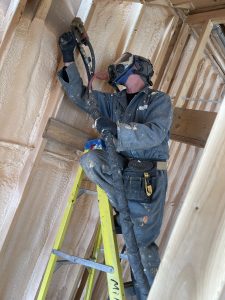Insulation
Spray Foam Insulation

Spray foam insulation is a popular option for homeowners and contractors alike, thanks to its versatility and effectiveness. It is created by mixing two chemicals together which react and expand rapidly, forming a foam that adheres to almost any surface. This allows it to fill even the smallest gaps and crevices, creating a complete and airtight seal that can greatly improve a home’s energy efficiency. Additionally, spray foam insulation has a long lifespan and is resistant to moisture, mold, and pests, making it a durable and reliable choice for insulation.
There are several advantages to choosing spray foam insulation for your home. First and foremost, it is an incredibly effective insulation material, able to significantly reduce energy costs by improving a home’s thermal performance. It also creates a seamless barrier that helps to prevent air leaks, moisture infiltration, and pests. Additionally, spray foam insulation can help to improve indoor air quality by reducing the amount of outdoor pollutants that can enter the home. Finally, this type of insulation has a long lifespan and requires minimal maintenance, making it a cost-effective and convenient choice for homeowners.
There are several advantages to choosing spray foam insulation for your home. First and foremost, it is an incredibly effective insulation material, able to significantly reduce energy costs by improving a home’s thermal performance. It also creates a seamless barrier that helps to prevent air leaks, moisture infiltration, and pests. Additionally, spray foam insulation can help to improve indoor air quality by reducing the amount of outdoor pollutants that can enter the home. Finally, this type of insulation has a long lifespan and requires minimal maintenance, making it a cost-effective and convenient choice for homeowners.
However, it is important to note that spray foam insulation should be installed by a professional contractor, as improper installation can lead to issues such as off-gassing or poor adhesion, which can compromise the insulation’s effectiveness and even cause health risks.
